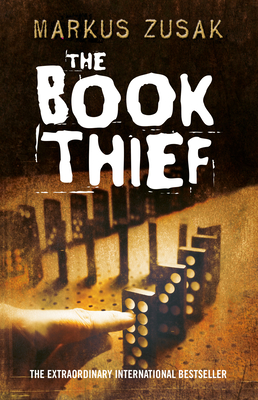Shelley Abreu is a freelance writer and mother to three (almost four!) children. She’s written for publications such as The Huffington Post, The Christian Science Monitor, Babble.com, Mamalode, FitPregnancy.com, Family Fun, and others. She considers motherhood and writing to be the two hardest yet worthwhile endeavors of her life. She’s currently working on a collection of poetry about motherhood. You can find the poems and other writing on her blog at www.wildlittlethings.com.

As I write my first young adult novel, it has become apparent that I love writing in this genre as much as I enjoy reading it. I’m currently reading Markus Zuzak’s The Book Thief, and it’s one of the best books I’ve read in a very long time. Not only is the story compelling, but the language itself is beautiful and evocative (I could underline at least one passage on every page). The setting is Nazi Germany, the narrator is none other than Death himself, and the protagonist is Liesel Meminger, a young girl who develops a love affair for books after her brother dies. It’s a story about the power of words and stories. It’s about friendship and life and death and everything that embodies. When I think about the genius it takes to write such a timeless and extraordinary book, I’m in awe of Markus Zusak; it’s everything a good book should be and more.

A few years ago, I started seriously writing poetry. I’ve had a copy of
A Poet’s Guide to Poetry by Mary Kinzie on my bookshelf since college, and recently I started rereading it. It’s more than just a reference book. Kinzie is able to explain poetry from the perspective of a poet, which makes the reading of this book both informative and enjoyable. She describes the process of reading and writing poetry almost like a relationship. She says, “The reader follows, via the poem as a ghostly map, the paths that were not taken by the author, but whose possibility leaves shadow like crosshatching on the paths that remain. To read this way keeps a poem always provisional and still in the making, which is how the process of reading absorbs the act of writing. . .” Kinzie has helped me not only understand how each individual word choice is a deliberate decision that drives the meaning of a poem, but also how to approach the process. In this way, writing poetry is like creating a treasure map. I used to consider the conventions of poetry---such as meter---too restrictive, but in fact, after reading this book, I see how the technical form of a poem is actually the secret to its meaning.
I also have a stack of classic literature on my bedside stand right now. I’m preparing to take a licensing test to become a high school English teacher, so I’m revisiting some old and new classics. Right now I’m staring at:
The Grapes of Wrath (Steinbeck),
Lolita (Nabokov),
Pride and Prejudice (Austen),
The Magic Mountain (Mann),
Ceremony (Marmon Silko),
Love Medicine (Erdrich) and the poetry of Emily Dickinson and Pablo Neruda. Every time I crack open one of these books, I get to share in yet another kind of human experience. Even though it’s fiction, reading a novel is similar to reading a poem. It’s a kind of roadmap for living. The only danger of reading for me is I tend to want to stay inside immersed in the stories. I must remember to put down the map and follow my own path every now and then!



